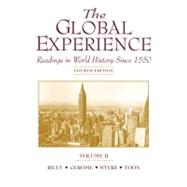
I. GLOBAL CONTACTS.
Early Modern Exploration and Expansion.
1. Cheng Ho Zheng He: Ming Maritime Expeditions.West Comes East: China and Japan.
4. Fernao Mendes Pinto, The Travels of Mendes Pinto.The African Slave Trade.
7. Olaudah Equiano, The Life of Olaudah Equiano, or Gustavus Vassa, The African.II. GLOBAL PATTERNS OF POLITICS AND CULTURE.
Degrees of Religious Toleration.
10. The Maryland Toleration Act.Early Modern Political Economy.
13. James Harrington, “The Commonwealth of Oceans.”Women's Rights and Democracy in the Enlightenment.
17. Sophia, Woman Not Inferior to Man.The Enlightenment in Russia.
20. Catherine II (The Great), The Instruction to the Commissioners for Composing a New Code of Laws.China's Sino-Centric World.
23. Ceremonial for Visitors: Court Tribute.III. REVOLUTIONS AND REBELLIONS.
Men and Women in Revolution.
26. The Declaration of Independence.America Asserts Itself.
31. The Monroe Doctrine.Global Revolutionary Ferment.
33. Women Miners in the English Coal Pits.Nationalism and Romanticism.
36. Robert Southey, “The Battle of Blenheim.”Racism.
41. Heinrich von Treitschke, A Word About the Jews Among Us.IV. EMPIRES AND UPHEAVALS.
England's Imperial March.
45. Lord William Bentinck, Comments on Ritual Murder and Limits of Religious Toleration.Japan: Tradition and Transformation.
48. Geisha, Glimpse of Unfamiliar Japan.United States Expansion: Two Perspectives.
52. The Roosevelt Corollary.V. AN ERA OF GLOBAL VIOLENCE
World War I.
54. Slaughter on the Somme.Bolshevik Utopian Dreams and Stalin's Revolution.
59. Nadezhda K. Krupskaya, “What a Communist Ought to Be Like.”Fascism: Three Faces.
62. Kita Ikki, Outline for the Reconstruction of Japan.World War II: Asia and Europe.
65. John Rabe, The Diaries of the Nanking Massacre.Patterns of Genocide.
69. Roupen of Sassoun, Eyewitness to Armenia's Genocide.VI. THE LATER TWENTIETH CENTURY.
The Cold War.
73. The Truman Doctrine.China and Soviet Russia Go Separate Ways.
78. Nikita S. Khrushchev, “Address to the Twentieth Party Congress.”Decolonization: Africa, Latin America, and India.
80. Frantz Fanon, The Wretched of the Earth.The Middle East: Politics and Upheaval.
83. Israel's Proclamation of Independence.America and the Second Indochina War.
85. Views of a Viet Cong Official.Africa in the Later Twentieth Century.
88. Kwame Nkrumah, I Speak of Freedom: A Statement of African Ideology.VII. THE TWENTY-FIRST CENTURY.
From Perestroika to a New Russia.
91. M. Gorbachev, Perestroika.Human Rights and International Relations.
92. The United Nations Declaration of Human Rights.Enduring Problems.
95. Deng Xiaoping, A Market Economy for Socialist Goals.The New copy of this book will include any supplemental materials advertised. Please check the title of the book to determine if it should include any access cards, study guides, lab manuals, CDs, etc.
The Used, Rental and eBook copies of this book are not guaranteed to include any supplemental materials. Typically, only the book itself is included. This is true even if the title states it includes any access cards, study guides, lab manuals, CDs, etc.